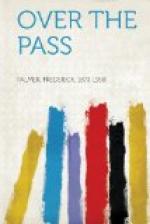How he did talk! He was a mill to which all intellectual grist was welcome. Over its wheel the water ran now singing, again with the roar of a cataract. He changed theme with the relish of one who rambles at will, and the emotion of every opinion was written on the big expanse of his features and enforced with gestures. He talked of George Washington, of Andrea del Sarto, of melon-growing, trimming pepper-trees, the Divina Commedia, fighting rose-bugs, of Schopenhauer and of Florence—a great deal about Florence, a city that seemed to hang in his mind as a sort of Renaissance background for everything else, even for melon-growing.
“You are getting over my head!” Jack warned him at times, politely.
“That is the trouble,” said Jasper Ewold. “Consider the hardship of being the one wise man in the world! I find it lonely, inconvenient, stupefying. Why, I can’t even convince Jim Galway that I know more about dry farming than he!”
Jack listened raptly, his face glowing. Once, when he looked in his host’s direction suddenly, after speaking to Mary, he found that he was the object of the same inquiring scrutiny that he had been on the porch. In lulls he caught the old man’s face in repose. It had sadness, then, the sadness of wreckage; sadness against which he seemed to fence in his wordy feints and thrusts.
“Christian civilization began in the Tuscan valley,” the philosopher proceeded, harking back to the book which had arrived by the evening’s mail. “Florence was a devil—Florence was divine. They raised geniuses and devils and martyrs: the most cloud-topping geniuses, the worst devils, the most saintly martyrs. But better than being a drone in a Florence pension is all this”—with a wave of his hand to the garden and the stars—“which I owe to Mary and the little speck on her lungs which brought us here after—after we had found that we had not as much money as we thought we had and an old fellow who had been an idling student, mostly living abroad all his life, felt the cramp of the material facts of board-and-clothes money. It made Mary well. It made me know the fulness of wisdom of the bee and the ant, and it brought me back to the spirit of America—the spirit of youth and accomplishment. Instead of dreaming of past cities, I set out to make a city like a true American. Here we came to camp in our first travelled delight of desert spaces for her sake; and here we brought what was left of the fortune and started a settlement.”
The spectator-philosopher attitude of audience to the world’s stage passed. He became the builder and the rancher, enthusiastically dwelling on the growth of orchards and gardens in expert fondness. As Jack listened, the fragrance of flowers was in his nostrils and in intervals between Jasper Ewold’s sentences he seemed to hear the rustle of borning leaf-fronds breaking the silence. But the narrative was not an idyll. Toil and patience had been the handmaidens of the fecundity of the soil. Prosperity had brought an entail of problems. Jasper Ewold mentioned them briefly, as if he would not ask a guest to share the shadows which they brought to his brow.




